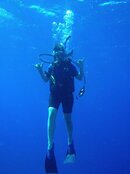I'd ask her what makes her nervous. If it's mask skills, spend some gear-free time working on that until it's effortless.
This is always an important start. Ask her to talk about it, and just listen and listen and listen.
After that, what I have found gives people the most confidence is simply being able to control their bodies with confidence in the water. That means not focusing on kneeling on the bottom working on skills. It means being properly weighted and just swimming around and having fun. It means being familiar with the feeling of neutral buoyancy. You will not believe how much of a difference that makes.
I started my scuba professional career assisting other instructors in traditional on-the-knees classes. I got used to what the divers looked like at the end of those classes, which were quite thorough in terms of teaching the skills to the standards. I also taught a bunch of Discover Scuba classes. The goal of those courses was to have the divers have fun. They were two hour sessions, with some of that time spent in the classroom teaching the basics, and some of it in the shallow end teaching just the amount of skill they needed to be safe in the deep end with whatever time remained. Once in the deep end, the Discover Scuba students--most of them children--got the hang of it quickly. They played games while swimming. When I saw they were progressing well, I would have them imitate me doing some skills and whatever else I felt like having them do that I thought they would enjoy.
I was bothered by fact that the typical Discover Scuba students looked like better divers at the end of those sessions than the OW students looked at the end of theirs, even though the OW students had had several times the amount of time in the pool and had learned many more skills. The DS students always had much better buoyancy control than the OW students. I could usually get them to imitate me doing a hover in a headstand position by the end of the session.
Now when I teach OW classes, I try to make swimming, swimming, swimming a part of it as much as I can. When I was negotiating with PADI about the article a group of us wrote about teaching OW classes differently, I told them the story about the discover scuba students mentioned above. I also described an OW class I had seen, taught within standards, in which students spent almost no time swimming and had no neutral buoyancy swimming skills at all. The new standards and policies PADI announced this year include the teaching methods our group advocated, but they also include a major emphasis on just plain neutral buoyancy swimming throughout the pool sessions. Maybe that conversation influenced that. At the end of the pool part of the new course, students are supposed to swim around in buddy teams, while they are occasionally asked without warning to do skills like air sharing, mask clearing, etc. They are expected to do these skills while swimming and without touching the bottom. They are expected to be able to respond to a request to tell their air pressure without looking, on the theory that they have been checking all the time and so know roughly where they are. You might want to do something like that with her.





